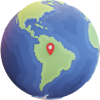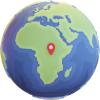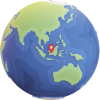Case studies are organised by region, with each region featuring links to the countries where the case studies are located.
Paraguay

In 2022, two government ministers in Paraguay were dismissed for alleged ties to an organised criminal group in the country. The Interior Minister and the head of the National Emergency Agency were both fired for links to a Brazilian drug trafficker with operations in Paraguay. This trafficker was tied to a criminal group allegedly moved cocaine by air from other countries, especially Bolivia, into Paraguay and then on to consumer markets in Europe and Africa.
In addition, a cattle rancher in Paraguay was arrested for his alleged part in the drug trafficking operation, where he laundered proceeds from the operation through various businesses he owned. During police raids connected with the case, thousands of cattle were seized as well. This highlights the interconnected nature of organised crime in the country with key industries that lead to deforestation, in this case namely the cattle industry.
Keywords: Latin America, Paraguay, cattle, primary prorduction, corruption and bribery, money laundering, drug trafficking, deforestation, serious organised crime
Source: https://www.occrp.org/en/daily/16027-paraguay-dismisses-ministers-over-links-to-drug-trafficking-suspects

The article titled “Paraguayan authorities complicit in illegal razing of country’s forests by EU-linked agribusiness” published on Earthsight, reveals the complicity of Paraguayan authorities in the illegal deforestation of the country’s forests by EU-linked agribusiness. The article is part of Earthsight’s “Grand Theft Chaco” series, which exposes the links between illegal deforestation for cattle ranching in the Paraguayan Chaco and leather used by car giants in Europe. The investigation focuses on PNCAT, the protected land belonging to the Ayoreo Totobiegosode people, including some of the last uncontacted groups in the world. The entire Chaco ecosystem is under intense attack by ranchers and soy growers, leading to the loss of its native forests and rich biodiversity. Two ranches within PNCAT, Caucasian SA and Cooperativa Chortitzer, illegally cleared over 2,700 and 500 hectares of forests respectively between 2018 and 2019 in contravention of government resolutions. Another farm, Yaguareté Porã, has a long history of illegal land dealings and pasture development within PNCAT dating back nearly 20 years. Earthsight was able to link hides from PNCAT to Italian automotive leather giant Conceria Pasubio and on to BMW and Jaguar Land Rover.
Keywords: Latin America, Paraguay, cattle, primary production, illegal deforestation, agriculture, Indigenous rights
Source: https://www.earthsight.org.uk/news/analysis/paraguayan-authorities-complicit-in-illegal-razing#:~:text=Bono%20for%20Earthsight-,Paraguayan%20authorities%20complicit%20in%20illegal%20razing,forests%20by%20EU%2Dlinked%20agribusiness&text=Earthsight's%20Grand%20Theft%20Chaco%20series,by%20car%20giants%20in%20Europe.

According to the U.S. Bureau of International Labour Affairs, there is strong evidence of forced labour, child labour, and other labour violations in cattle raising areas of Brazil and Paraguay, specifically in the Brazilian State of Mato Grosso do Sul and in the Paraguayan Department of Boquerón. Indeed, in Brazil and Paraguay's extensive cattle-raising industries, employers are using coercive recruitment and employment practices. These primarily affect rural and indigenous populations that are falsely promised improved livelihoods. The growing global demand for beef is driving the expansion of cattle operations in these countries, exacerbating the risk of forced labour. In both countries, small and medium cattle producers, supplying to larger international slaughterhouses, often use advance payments to trap workers in debt bondage. Workers face coercion, threats, and restrictions on their freedom, with employers commonly retaining their identification documents. The remote locations of cattle ranches and workers' reliance on employers for food and housing further contribute to conditions that facilitate forced labour.
Keywords: Latin America, Paraguay, cattle, primary production, forced labour, child labour, modern slavery
Sources: https://www.dol.gov/agencies/ilab/project-increase-worker-voice-and-address-forced-labor-child-labor-and-other-labor#:~:text=Employers%20in%20Brazil%20and%20Paraguay's,the%20promise%20of%20better%20livelihoods
Venezuela

An InSight Crime Article reports that in Venezuela, criminal groups and state forces are colluding in widespread cattle theft, significantly linked to drug trafficking and characterised by corruption and bribery. Criminal organisations, alongside corrupt officials and military personnel, orchestrate cattle theft from ranchers, using bribery and coercion to facilitate these operations. Stolen cattle are often sold to fund drug trafficking activities, with corrupt authorities turning a blind eye or actively participating for financial gain. This illicit network exploits the country's economic instability and legal system weaknesses, creating a lucrative cycle of crime that exacerbates violence and lawlessness in rural areas. The involvement of state forces adds a layer of complexity, undermining trust in government institutions and law enforcement. Addressing this issue requires dismantling the corrupt alliances between criminals and officials, strengthening legal frameworks, and ensuring accountability to combat the intertwined issues of bribery, corruption, and drug-related crime in Venezuela’s cattle industry.
Keywords: Latin America, Venezuela, cattle, primary production, trade and transport, organised crime, drug trafficking, corruption and bribery
Source: https://insightcrime.org/news/criminal-groups-state-forces-allied-cattle-theft-venezuela/


The Environmental Crimes Financial Toolkit is developed by WWF and Themis, with support from the Climate Solutions Partnership (CSP). The CSP is a philanthropic collaboration between HSBC, WRI and WWF, with a global network of local partners, aiming at scaling up innovative nature-based solutions, and supporting the transition of the energy sector to renewables in Asia, by combining our resources, knowledge, and insight.


